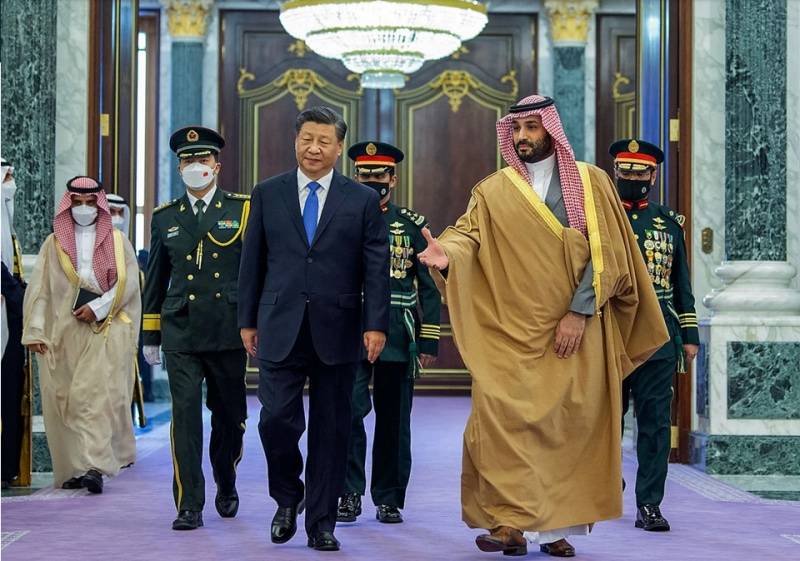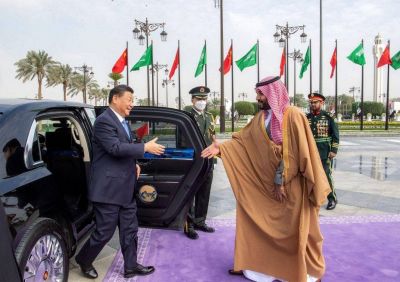
Saudi Crown Prince Mohammad bin Salman receives Chinese President Xi Jinping in Riyadh in December 2022. (Credit: Bandar al-Jaloud/AFP)
On March 10, Saudi Arabia and Iran restored diplomatic relations, following China-brokered talks, seven years after severing ties. Riyadh hopes to bring stability to the Middle East region through this historic agreement, which has placed Beijing at the center of the geopolitical game — a role that in recent history has traditionally been played by the United States.
A few months earlier, it was with Moscow, another rival of Washington, that Riyadh made a deal. The OPEC+ group decision to cut oil output was seen as favoring Moscow at a time when Russia is under Western sanctions over its February 2022 invasion of Ukraine. The deal was also perceived as a slap in the face to US President Joe Biden, who had arrived in Jeddah in July, despite strained relations with Saudi Crown Prince Mohammed bin Salman (MBS), seeking more oil production to contain inflation.
These two developments stand for the Asian pivot that Saudi Arabia started in recent years. It is one of the cornerstones of the Saudi First narrative that the crown prince adopted as a political mantra. Priority is given to the stabilization of the region, attraction of foreign investment and stimulation of growth to implement Saudi Vision 2030, in preparation for the post-oil era.
To this end, Riyadh has been diversifying its economic and strategic partnerships, even if doing so means angering Washington by favoring its rivals, Russia and China.
MBS “sees the emerging geopolitical order as malleable, made up of a set of interlocking parts, and he believes Riyadh has the right to work with a shifting constellation of partners to move markets and shape political outcomes,” Karen Young, a political economist focusing on the Gulf at the Middle East Institute, wrote in Foreign Policy in November.
“OPEC+ is neither ideological nor treaty-bound. Rather, it is an alliance of countries that are willing to do business with each other when it suits their shared interests,” Young wrote.
The way Riyadh perceived the US disengagement in the Middle East has also driven this willingness for diversification. The lack of any US reaction to the 2019 attacks on Aramco oil installations, which were attributed to Iran, shocked the kingdom and led it to question the “oil-for-security” doctrine — a mainstay of the two countries’ bilateral relations for nearly 80 years.
The failure of the Iran nuclear deal and former US President Donald Trump’s “maximum pressure” policy also showed that Washington was unable to contain Tehran, pushing Riyadh to turn to Beijing.
Giorgio Cafiero, CEO of Gulf State Analytics, a Washington, DC-based think tank, said, “China was able to broker the March 10th diplomatic agreements because Beijing has a balanced foreign policy in the Gulf region.”
“It is on excellent terms with the six GCC states, as well as with Iran and Iraq, unlike the United States, which has pursued an anti-Iranian policy since 1979. Beijing is a burgeoning diplomatic player,” Cafiero said.
The Gulf giant thus multiplied its partnerships with China, Russia and other Asian countries, such as South Korea and Japan, in strategic sectors, including energy, mining, petrochemicals, defense and telecommunications.
With Moscow, oil cooperation has increased since the war in Ukraine began last year — this cooperation extends well beyond the OPEC+ group. According to an investigative report by The Wall Street Journal, Saudi Arabia and the United Arab Emirates imported a record quantity of low-cost Russian crude and naphtha, an oil derivative, for domestic consumption since Russia invaded Ukraine.
With China, relations stepped up to “comprehensive strategic partnership” during Xi Jinping’s visit to Riyadh where he received a lavish welcome in December. During this summit, 35 investment agreements and some 20 contracts totaling more than $29 billion were signed. Beijing was already importing a quarter of Saudi oil exports.
In March, Saudi Arabia joined the Shanghai Cooperation Organization (SCO) as a dialogue partner. The China-led organization includes Russia, India and Pakistan, as well as four Central Asian states. Iran plans to join the SCO in 2023. This symbolic step is emblematic of Saudi Arabia’s Asian pivot.
Diplomatic broker
A deal with China’s tech giant, Huawei, is another highlight of Saudi-Chinese cooperation. The kingdom and its Gulf neighbors chose the Chinese tech giant for their 5G and cloud computing deployment. Washington views this initiative suspiciously. In 2022, an FBI investigation found that Huawei’s equipment has the potential to disrupt US military communications, including its nuclear arsenal. The Gulf is home to some 30,000 US troops across several bases. The US also perceives China's assistance to Riyadh in building its own ballistic missiles negatively as the move further expands their cooperation in weaponry.
Yet, the Saudi shift to the East has a number of limitations. First, Washington remains Riyadh’s primary partner in key defense and security sectors. The first joint counter-drone exercise organized by the US army at the Red Sands military testing center in the Saudi desert in March is a reminder of this partnership.
“No military presence in the region is similar to that of the United States,” said Cafiero, citing CENTCOM in Qatar and the Fifth Fleet headquarters in Bahrain. “Saudi Arabia’s security cannot be secured by Russia, whose serious weaknesses were exposed in Ukraine. China, for its part, is a diplomatic broker, not a security guarantor.”
Moreover, Saudi Arabia imported 82 percent of its weapons from the United States between 2017 and 2021, according to the Stockholm International Peace Research Institute. While the Gulf heavyweight has turned to China to develop its nuclear program, with no power plants yet built, Beijing’s equipment is not as sophisticated as that of the Americans. Furthermore, MBS’s condition for normalization with Israel is the US help with the development of the civilian nuclear program.
The red lines for Washington in relation to Saudi Arabia’s cooperation with US rivals have yet to be defined. After the OPEC+ announcement in October, Biden said “there will be consequences” for the US-Saudi relationship; however, his statement was never put into action. Would the same be true if Saudi Arabia and China increased digital cooperation? The UAE, also connected to Huawei’s 5G, paid the price: the United States refused, partly for this reason, to sell them the F-35 stealth fighters that Abu Dhabi has been trying to obtain for years.
“The question will be more about projects like NEOM [the futuristic city under construction in Tabuk province in the northwest of Saudi Arabia] and smart cities, because they will involve important electronic components,” said Robert Mogielnicki, an expert on China-Gulf relations at the Arab Gulf States Institute. “It will then be necessary to analyze whether and where Chinese equipment poses a real threat to US diplomatic and military interests.”
According to the news website Business Insider, Saudi smart cities could use Chinese surveillance technologies, such as the biometric facial recognition technology, which China seeks to “normalize” around the world.
Dependence on the dollar
In order for Saudi Arabia to implement Saudi Vision 2030, it must avoid establishing itself in the eyes of the West as belonging to the rival camp. The Russian and Chinese contributions in terms of investments and transfer of skills are limited. “Moscow is not in a position to be a major economic partner for Saudi Arabia,” said Mogielnicki. “China can of course take on this role, but there are many cases where its commitments have not been successful in the region, such as in Oman and Kuwait. Chinese actors alone will not be sufficient economic partners for Saudi Arabia.”
The Saudi dependence on the US monetary system is holding back China’s ambitions to conduct oil transactions in yuan. Although earlier this year Saudi Finance Minister Mohammed al-Jadaan said he was open to the idea, it does not appear to have been implemented. As the riyal is pegged to the dollar, the decision to export oil in another currency could signal to the markets the greenback’s instability. In the event of a depreciation in the value of the US dollar, the Saudi currency would be affected.
Lastly, the Saudi-Iranian agreement concluded in March also conceals weak points. While Beijing has succeeded in setting in stone a reconciliation between Riyadh and Tehran, mistrust hangs over this formalized détente between the two regional heavyweights. By dint of proxy wars, Iran has permanently placed its pawns in Lebanon, Syria, Iraq and Yemen. Nothing indicates that it will be ready to diminish its influence, which has cost it dearly both in economic terms and in human lives.
Certainly, China retains important leverage against Iran. The two countries have signed a “strategic cooperation” agreement worth $400 billion over 25 years, which provides for Chinese investment in exchange for Iranian oil at reduced prices. Iran, suffocated by Western sanctions, has every interest in following the dynamic of regional détente that Saudi Arabia is trying to establish. But there is no guarantee that Chinese “diplomatic brokering” will eventually be able to prevent an Iranian attack against Riyadh or its interests in the region.
This article was originally published in French in L'Orient-Le Jour. Translation by Joelle El Khoury.
